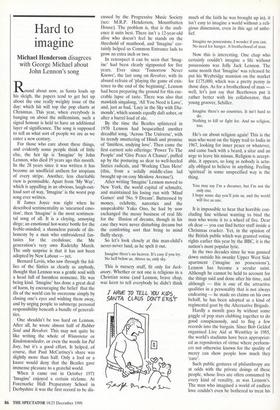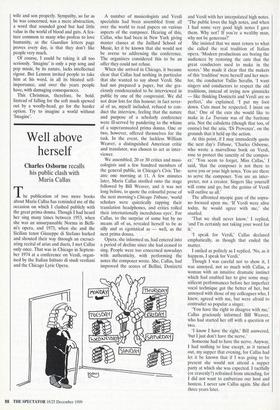Hard to imagine
Michael Henderson disagrees with George Michael about John Lennon's song Round about now, as Santa loads up his sleigh, the papers tend to get het up about the one really weighty issue of the day: which hit will top the pop charts at Christmas. This year, when everybody is banging on about the millennium, such a signal honour is held to have an additional layer of significance. The song is supposed to tell us what sort of people we are as we enter a new century.
For those who care about these things, and evidently some people think of little else, the hot tip is 'Imagine' by John Lennon, who died 19 years ago this month. In the 28 years since it was written it has become an unofficial anthem for utopians of every stripe. Another, less charitable view is permissible. Apart from 'My Way', which is appalling in an obvious, laugh-out- loud sort of way, 'Imagine' is the worst pop song ever written.
If James Joyce was right when he described sentimentality as 'unearned emo- tion', then 'Imagine' is the most sentimen- tal song of all. It is a cloying, annoying dirge; an emotional hot-water bottle for the feeble-minded; a shameless parade of dis- honesty by a man who embroidered fan- tasies for the credulous; the Me generation's very own Radetzlcy March. The only surprise is that it has not been adopted by New Labour yet.
Bernard Levin, who saw through the fol- lies of the Sixties as clearly as anybody, thought that Lennon was a gentle soul with a head full of harmless nonsense. He was being kind. 'Imagine' has done a great deal of harm, by encouraging the belief that the ills of the world can be overcome simply by closing one's eyes and wishing them away, and by urging people to submerge personal responsibility beneath a bundle of generali- ties.
One shouldn't be too hard on Lennon. After all, he wrote almost half of Rubber Soul and Revolver. This may not quite be like writing the whole of Winterreise or Kindertotenlieder, or even the words for Pal key, but it's a good effort. It helped, of course, that Paul McCartney's share was slightly more than half. Only a fool or a knave would deny that the Beatles gave immense pleasure to a grateful world.
When it came out in October 1971 'Imagine' enjoyed a certain r6clame. At Foremarke Hall Preparatory School in Derbyshire it was the first record to be dis-
cussed by the Progressive Music Society (sec: M.R.P. Henderson, Mountbatten House). The problem is, that is the audi- ence it suits best. There isn't a 12-year-old alive who doesn't feel he stands on the threshold of manhood, and 'Imagine' cer- tainly helped us Common Entrance lads to grow an extra inch or two.
In retrospect it can be seen that 'Imag- ine' had been clearly signposted for five years. Ever since 'Tomorrow Never Knows', the last song on Revolver, with its absurd refrain of 'playing the game of exis- tence to the end of the beginning', Lennon had been preparing the ground for this exe- crable lapse of taste. There was also that mawkish singalong, 'All You Need is Love', and, just as bad, 'Lucy in the Sky with Dia- monds', which sounds equally daft sober, or after a barrel load of ale.
By the time the Beatles splintered in 1970 Lennon had bequeathed another dreadful song, 'Across The Universe', with its trendy smattering of Hindi and promise of 'limitless, undying love'. Then came the first earnest solo offerings: 'Power To The People' and 'Give Peace A Chance', puffed up by the posturing so dear to well-heeled Sixties radicals, and 'Working Class Hero' (this, from a solidly middle-class lad brought up on cosy Menlove Avenue!).
After writing 'Imagine' Lennon moved to New York, the world capital of schmaltz, and maintained his losing run with 'Mind Games' and `No. 9 Dream'. Buttressed by money, celebrity, narcotics and the unspeakable Yoko Ono, he had by now exchanged the messy business of real life for the illusion of dreams, though in his case they were never disturbing dreams but the comforting sort that bring to mind fluffy sheep.
So let's look closely at this man-child's never-never land, as he spelt it out.
Imagine there's no heaven. It's easy if you try. No hell below us. Above us, only sky.
This is nursery stuff, fit only for Jack- anory. Whether or not one is religious in a Christian sense (and Lennon, brave chap, was keen to tell everybody he didn't think
much of the faith he was brought up in), it isn't easy to imagine a world without a reli- gious dimension, even in this age of unbe- lief.
Imagine no possessions. I wonder if you can. No need for hunger. A brotherhood of man.
Now this is interesting. One chap who certainly couldn't imagine a life without possessions was Jolly Jack Lennon. The same month that 'Imagine' was released he put his Weybridge mansion on the market for 075,000, which was a pretty penny in those days. As for a brotherhood of man — well, let's just say that Beethoven put it rather better with his collaborator, that young groover, Schiller.
Imagine there's no countries. It isn't hard to do.
Nothing to kill or fight for. And no religion, too.
He's on about religion again! This is the man who went on the hippy trail to India in 1967, looking for inner peace or whatever, and came back with a beard, a sitar and an urge to leave his missus. Religion is accept- able, it appears, so long as nobody is actu- ally obliged to believe in anything. Feeling 'spiritual' in some unspecified way is the thing.
You may say I'm a dreamer, but I'm not the only one.
I hope some day you'll join us, and the world will live as one.
It is impossible to hear that horrible con- cluding line without wanting to bind the man who wrote it to a wheel of fire. Dear oh dear — you can find better stuff inside a Christmas cracker. Yet, in the opinion of the British public which was granted voting rights earlier this year by the BBC, it is the nation's most popular lyric.
In the two decades since he was gunned down outside his swanky Upper West Side apartment ('imagine no possessions'), Lennon has become a secular saint. Although he cannot be held to account for the things said and done after his time, and although — this is one of the attractive qualities in a personality that is not always endearing — he made no claims on his own behalf, he has been adopted as a kind of regimental goat by the Alternative Brigade.
Hardly a month goes by without some gaggle of pop stars clubbing together to do good conspicuously, and to flog a few records into the bargain. Since Bob Geldof organised Live Aid at Wembley in 1985, the world's stadiums have been appropriat- ed as repositories of virtue where perform- ers not otherwise known for the quality of mercy can show people how much they 'care'.
Such public gestures of philanthropy are at odds with the private doings of these people, whose lives are often consumed by every kind of venality, as was Lennon's. The man who imagined a world of endless love couldn't even be bothered to treat his
wife and son properly. Sympathy, so far as he was concerned, was a mere abstraction, a word that sounded good but had little value in the world of blood and guts. A fea- ture common to many who profess to love humanity, as the Guardian letters page proves every day, is that they don't like people very much.
Of course, I could be taking it all too seriously. 'Imagine' is only a pop song and pop music, by its nature, lacks intellectual rigour. But Lennon invited people to take him at his word, in all its bloated self- importance, and over the years people have, with damaging consequences.
This Christmas, therefore, be bold. Instead of falling for the soft mush spewed out by a woolly-head, go for the harder option. Try to imagine a world without 'Imagine'.























































































































 Previous page
Previous page